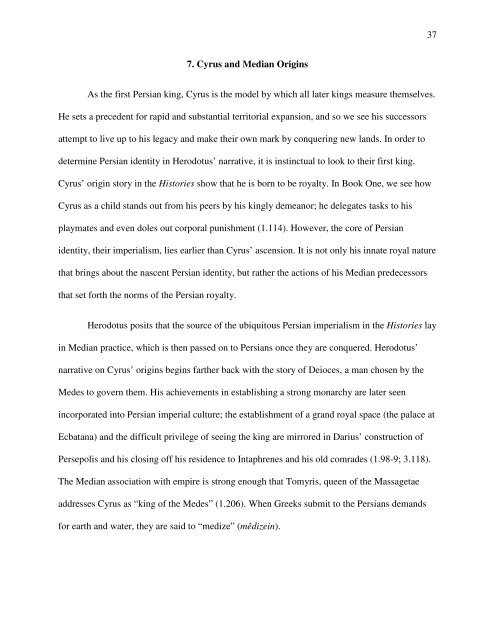The Old and the Restless - The Egyptians and the Scythians in Herodotus' Histories by Robert J. Hagan
You also want an ePaper? Increase the reach of your titles
YUMPU automatically turns print PDFs into web optimized ePapers that Google loves.
37<br />
7. Cyrus <strong>and</strong> Median Orig<strong>in</strong>s<br />
As <strong>the</strong> first Persian k<strong>in</strong>g, Cyrus is <strong>the</strong> model <strong>by</strong> which all later k<strong>in</strong>gs measure <strong>the</strong>mselves.<br />
He sets a precedent for rapid <strong>and</strong> substantial territorial expansion, <strong>and</strong> so we see his successors<br />
attempt to live up to his legacy <strong>and</strong> make <strong>the</strong>ir own mark <strong>by</strong> conquer<strong>in</strong>g new l<strong>and</strong>s. In order to<br />
determ<strong>in</strong>e Persian identity <strong>in</strong> Herodotus’ narrative, it is <strong>in</strong>st<strong>in</strong>ctual to look to <strong>the</strong>ir first k<strong>in</strong>g.<br />
Cyrus’ orig<strong>in</strong> story <strong>in</strong> <strong>the</strong> <strong>Histories</strong> show that he is born to be royalty. In Book One, we see how<br />
Cyrus as a child st<strong>and</strong>s out from his peers <strong>by</strong> his k<strong>in</strong>gly demeanor; he delegates tasks to his<br />
playmates <strong>and</strong> even doles out corporal punishment (1.114). However, <strong>the</strong> core of Persian<br />
identity, <strong>the</strong>ir imperialism, lies earlier than Cyrus’ ascension. It is not only his <strong>in</strong>nate royal nature<br />
that br<strong>in</strong>gs about <strong>the</strong> nascent Persian identity, but ra<strong>the</strong>r <strong>the</strong> actions of his Median predecessors<br />
that set forth <strong>the</strong> norms of <strong>the</strong> Persian royalty.<br />
Herodotus posits that <strong>the</strong> source of <strong>the</strong> ubiquitous Persian imperialism <strong>in</strong> <strong>the</strong> <strong>Histories</strong> lay<br />
<strong>in</strong> Median practice, which is <strong>the</strong>n passed on to Persians once <strong>the</strong>y are conquered. Herodotus’<br />
narrative on Cyrus’ orig<strong>in</strong>s beg<strong>in</strong>s far<strong>the</strong>r back with <strong>the</strong> story of Deioces, a man chosen <strong>by</strong> <strong>the</strong><br />
Medes to govern <strong>the</strong>m. His achievements <strong>in</strong> establish<strong>in</strong>g a strong monarchy are later seen<br />
<strong>in</strong>corporated <strong>in</strong>to Persian imperial culture; <strong>the</strong> establishment of a gr<strong>and</strong> royal space (<strong>the</strong> palace at<br />
Ecbatana) <strong>and</strong> <strong>the</strong> difficult privilege of see<strong>in</strong>g <strong>the</strong> k<strong>in</strong>g are mirrored <strong>in</strong> Darius’ construction of<br />
Persepolis <strong>and</strong> his clos<strong>in</strong>g off his residence to Intaphrenes <strong>and</strong> his old comrades (1.98-9; 3.118).<br />
<strong>The</strong> Median association with empire is strong enough that Tomyris, queen of <strong>the</strong> Massagetae<br />
addresses Cyrus as “k<strong>in</strong>g of <strong>the</strong> Medes” (1.206). When Greeks submit to <strong>the</strong> Persians dem<strong>and</strong>s<br />
for earth <strong>and</strong> water, <strong>the</strong>y are said to “medize” (mêdize<strong>in</strong>).
















